Is toothpaste safe? It depends. Here are 8 toxic ingredients found in many brands of toothpaste … and how they can damage your health.
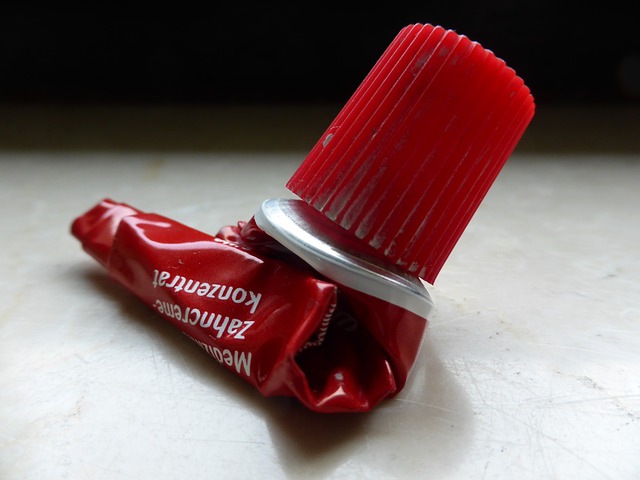
Image by Esther Merbt from Pixabay
Over your lifetime, you’ll use about 20 gallons of toothpaste. The chemicals in that toothpaste can get into your bloodstream. Even though you don’t swallow it, your mouth can absorb it. Let’s take a look at what’s in your toxic toothpaste.
Is Toothpaste Safe? Toothpaste Toxins to Watch Out For
Look on the back of your toothpaste tube. What ingredients are listed? Can you even pronounce them? My thought: If you can’t or struggle to pronounce it, you probably shouldn’t put it in your body.
You May Also Enjoy:
“6 Reasons You Should Be Using Tooth Powder”
“Equisetum Hyemale (Horsetail): The BEST Plant for Tooth Health + 8 More Benefits!”
There are certain risks with a lot of common toothpaste ingredients, even though they are branded as “natural.” The chemicals in your toothpaste are known to cause mental and physical problems, inflammation, and cancer.
Toothpaste Toxin #1: Artificial Colors, Flavors, and Sweeteners
Toothpaste often contains artificial colors, flavors, and sweeteners, especially toothpaste branded for children. These are linked to hyperactivity and behavioral problems.
FD&C and D&C dyes are made from petroleum. The term “lake” is a colorant made by combining a pigment with metal salts, usually aluminum, zirconium, titanium, and others.
Aspartame and artificial sweeteners are added to toothpaste to make it taste good. Aspartame in the body breaks down to wood alcohol and formaldehyde. Both of these are stored in your liver or kidneys. They are not eliminated from the body.
Toothpaste Toxin #2: Fluoride
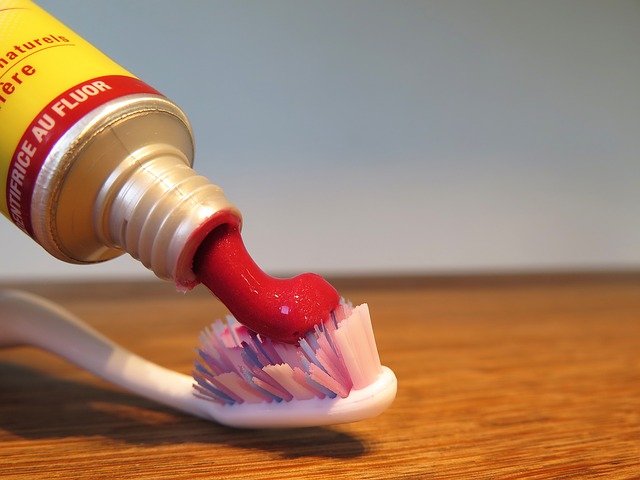
Image by Ludwig Willimann from Pixabay
I could write an entire article on the dangers of fluoride.
In a 2010 study, researchers found that a beneficial layer of fluorapatite was formed on your teeth from fluoride, but it was only 6 nanometers thick. Let’s put that into perspective—you’d need 10,000 of those layers to be the width of a human hair. The ultra-thin layer disappears as soon as you chew something.
Now consider the toxic nature of fluoride. It is a chemical that accumulates in your tissue over time. It can cause neurological, as well as endocrine system problems.
Toothpaste Toxin #3: Triclosan
To fight plaque and gingivitis, Triclosan, an antibacterial chemical is added to toothpaste. However, it has been linked to antibiotic resistance, endocrine disruption, and thyroid dysfunction.
You May Also Enjoy:
“10 Natural Ways to Care for Your Teeth and Gums”
“How to Grow Equisetum Hyemale”
“23+ Surprising Sources of Toxic Aluminum … and How to Detox!”
Its chemical makeup is similar to thyroid hormones. Triclosan causes a wide-range of health problems including breast, ovarian, prostate, and testicular cancer, preterm and low birth weight babies, pre-puberty in girls, and undescended testicles in boys.
Download our better-than-toothpaste powder recipe below and learn the 5 must-have ingredients. And not only is it yummy, but it’s also highly effective and it’s is safe for children and those with thyroid conditions. Make it with your children or grandkids as a fun project. Kids like to brush when they help to make the toothpaste!
Toothpaste Toxin #4: Sodium Lauryl Sulfate
This harmful chemical is responsible for the foaming action of your toothpaste.
Sodium Lauryl Sulfate has also been linked to skin irritation and canker sores. It is registered as an insecticide. The manufacturer sought approval to market Sodium Lauryl Sulfate as an organic pesticide. The application was denied because of the potential environmental hazard.
Studies have shown that it may have toxic effects on marine life.
Toothpaste Toxin #5: Formaldehyde-Releasing Preservatives
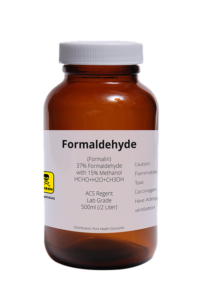
Image by burlesonmatthew from Pixabay
Some of the chemicals in toothpaste release formaldehyde—a known carcinogen. These preservatives kill microbes that might grow in the toothpaste.
The preservatives are absorbed into your bloodstream through the lining of your mouth. It can also cause allergic skin reactions.
Here are 10 formaldehyde-releasing preservatives to watch out for:
- DMDM hydantoin
- Diazolidinyl urea
- Imidazolidinyl urea
- Polyoxymethylene urea
- Methenamine
- Quaternium-15
- Sodium hydroxymethylglycinate
- Bronopol
- Bronidox
- Glyoxal
Toothpaste Toxin #6: Parabens
These chemicals are endocrine disruptors that have been linked to cancer and developmental and reproductive issues. They act like the hormone, estrogen.
Keep an eye out for these chemicals in your toothpaste:
- Methylparaben
- Ethylparaben
- Isobutylparaben
- Propylparaben
- Butylparaben
- Isopropylparaben
Toothpaste Toxin #7: Carrageenan
This thickening agent (sometimes used in gelatin-free gummy candies) is a suspected carcinogen. According to current research, food-grade carrageenan creates intestinal inflammation that can lead to cancer, even in small doses.
It has been linked to:
- Free radicals
- Inflammation
- Insulin resistance
- Glucose intolerance
Toothpaste Toxin #8: Diethanolamine (DEA)
This foaming agent is a known hormone disrupter that reacts with other ingredients. It forms a potential carcinogen called N-nitrosodiethanolamine (NDEA), which is readily absorbed through the skin. It has been linked to stomach, esophagus, liver, and bladder cancers.
On another note …
Many kinds of toothpaste include ingredients that are genetically modified organisms (GMOs). The only way to avoid these is to buy products that carry the USDA 100% Organic label.
You May Also Enjoy:
“Natural Tooth Care—Doug Simons and Marjory Wildcraft”
“10 Medicinal Uses for Comfrey: Wound Healer, Muscle Relaxer, Ulcer Treatment, Eyewash, and More”
Is Toothpaste Safe? This Is.
So how do you brush your teeth with all of these toxins in commercial toothpaste formulas?
There are several healthy and safer alternative products on the market. Look at your local health food store for some of their recommendations.
Or, with a few ingredients, you can make your own.
Simple and Natural Toothpaste (Recipe)
Brushing twice a day, this recipe lasts about a month.
The Foundation for Healthy Teeth
Remember that your diet is essential as the foundation for healthy teeth and gums. Your oral health depends on:
- Vitamins C, D, and K2
- Magnesium
- Phosphorus
- Potassium
- Calcium
What Do You Think?
How do you take care of your teeth and gums? Share your best tips in the comments below!
This is an updated version of an article that was originally published on August 16, 2017.
The Grow Network is a participant in the Amazon Services LLC Associates Program, an affiliate program designed to provide a means for our team to earn fees for recommending our favorite products! We may earn a small commission, at no additional cost to you, should you purchase an item after clicking one of our links. Thanks for supporting TGN!
__________
Additional Resources
Is Your Toothpaste Toxic? Progressive Health. Is Your Toothpaste Loaded With Toxins? Mercola.Epoch Times August 26, 2015Behind the Dazzling Smile: Toxic Ingredients in Your Toothpaste. Cornucopia report.
Marjory Wildcraft is the founder of The Grow Network, which is a community of people focused on modern self-sufficient living. She has been featured by National Geographic as an expert in off-grid living, she hosted the Mother Earth News Online Homesteading Summit, and she is listed in Who’s Who in America for having inspired hundreds of thousands of backyard gardens. Marjory was the focus of an article that won Reuter’s Food Sustainability Media Award, and she recently authored The Grow System: The Essential Guide to Modern Self-Sufficient Living—From Growing Food to Making Medicine.
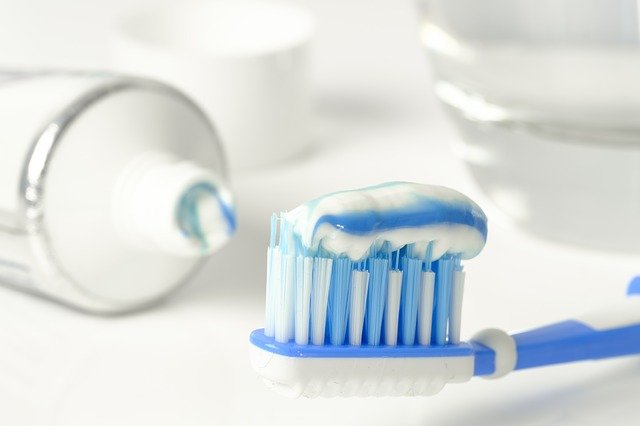
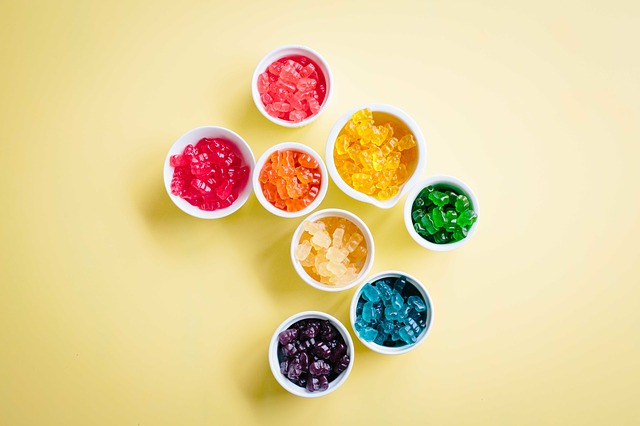
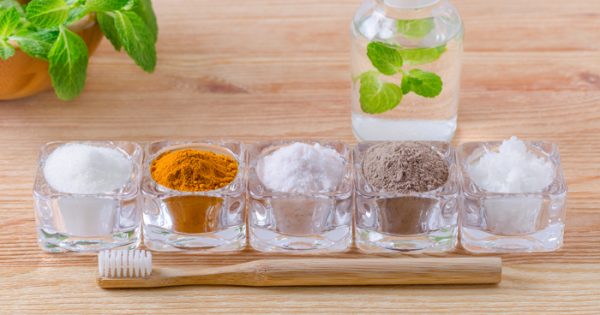







COMMENTS(29)
I use an essential oil blend with a bass toothbrush designed to get the oils under the gumline and gingivitis has been gone for years! This is so much better than using toothpaste, and your teeth feel much cleaner as well! So glad that I have learned about the power of essential oils!
@Rebecca: What is a bass toothbrush? Where does one get such a thing?
I make my own toothpowder and have been for years. I was amazed when a new hygienist asked me if I use an electric toothbrush ( I don’t) because my teeth were in such good shape.
Are there any natural healthy toothpastes we can buy in store or online? May make this recipe in the future…thanks for sharing.
We love the mint Auromere with Neem oil! Fortunately for us, it is available at our local health products store for about $3 less than online, BUT…one tube lasts 2 of us for almost 2 months.
I started using “Truth Paste” which I liked, but decided I could make my own. I have been using clay from Redman Utah, for other purposes for several years, including internally. I use part clay, baking soda, probiotic, coconut oil and EO peppermint, a dash of Real Salt, and with a little water. I love it. The salt and the clay from this company are certified Kosher. (Truth Paste is available online from Amazon and has several more Essential oils in, but is also fluoride free)
We just use baking soda, that’s it. Our teeth have never been cleaner or stronger.
I’ve made a similar recipe and just want to share a tip for those in cold climates: regular coconut oil will harden (I think at 67 degrees) and become difficult to use. We switched to fractionated coconut oil (stays liquid) and the problem was solved. We saved that first batch for summer when our house was warm enough to keep the toothpaste soft.
There’s definately a lot to find out about this topic. I really
like all the points you’ve made.
I use a toothpaste for sensitive teeth (hot and cold). Any suggestions for making my own?
Hello Karen,
Calcium carbonate powder will fill in tiny cracks and make your tooth enamel stronger which will stop
sensitivity to hot and cold.
I read this at Amazon.com while purchasing calcium carbonate powder to make chalk paint.
Several comments were posted, at Amazon, regarding calcium carbonate for stronger teeth.
Claudia
Thank you for this great information. As i have no xylitol at home, i modified the ingredients as adding 20 drops of propolis( in alcohol solution), 1 teaspoon of olive leaf liquid extract and as sweetener 1/2 tbsp black mulberry sirop( it is Good for gum healing. Noel the solution contains water. What do you think about this? Water can be a menstruum for bacterial growth? So i added propolis into the mixture and also essential oils like teatree oil, peppermint, lavender and rosemary ,as you know, have antibacterial effects. I would be very grateful if you share your opinions with me. Thank you.
Burak Küçükebe, Md.
@Burak, propolis can stick to and stain your teeth. Also, what is the mulberry sirop sweetened with? I suggest adding Sangre de Grado, sometimes known as Sangre De Drago, and Sea Buckthorn essential oil, both very good for gum healing as well.
I am surprised that glycerin did not make it to your list of dangerous ingredients! Glycerin is in most commercial toothpastes and many so-called natural ones, too. I fills in the microscopic porous surface of teeth and prevents re-
mineralization. Please do the research and add it to your list!
I live in a very rural area and do not have access to a health fool store with any variety. Can anyone give me a good source for essential oils. Thanks.
I live in a very rural area as well. My favorite mail order sources for reliable high quality essential oils are anandaapothecary.com and originalswissaromatics.com. Ananda often has specials and though their website is a bit hard to navigate they are working on a new one. Good luck!
I noticed that someone had already asked this but did not see any reply, so I am asking again. Does anyone have a recipe that includes something for sensitive teeth? At present I am using a commercial product once a day and a natural product once a day. Both times, I dip the brush and paste into a mixture of baking soda and mineral salt. Without the commercial product, the teeth get very sensitive but it is full of stuff I do not want in my body. Any ideas how to get around that?
I am also going to make my own paste since the ‘natural’ product has several items on this list, including glycerine, which someone has commented on.
Thanks for any help.
Sharon
Xylitol helps with sensitive teeth. I would absolutely not use baking soda on sensitive teeth, it is abrasive and removes enamel! Check out orawellness.com, this is an amazing site with excellent products and information.
Meghan, I took your advice and that of others and began to use calcium carbonate and xylitol as my toothpaste. I still use a bit of salt and a bit of baking soda as they freshen the mouth more than the other two. I hope these do the trick. I also tried oil pulling for about 6 weeks, at the beginning of this process, and I also think that worked to get the whole train moving. I have supported too many periodontists for far too many years. It is time to make a change. Taking up a vegetarian diet helped the most and i did that about 40 years ago now. I went from seeing the dentist for cleaning every three months to one year to every five years and sometimes they ask why I even came in. Big change, but more to go.
Will this work for implants? I have all implants. I just need health gums.
I have not used toothpaste for over 20 years. I make a mixture myself of 3 essential oils:
peppermint, spearmint and almond oil, mixed in a ratio of 2:2:1 (as listed).
I floss regularly and brush once per day before bed.
i have long known of the dangers of flouride which most if not all toothpastes have some content… and with what is known about flourides (pause) why then is there no mention of it in this article? is it because the powers that be are putting you in peril if you mention this?
I use a charcoal toothpaste from a local health food store. I just started using it. Has anyone else heard of this or tried it?
I do not have bad teeth,but recently I discovered a hole in 1 tooth,I red, it could grow and heal back to a healthy tooth,but I still haven’t found out how? I use since several years organic toothpaste,since I discovered the thruth about fluoridation I hate going to the dentist since I was a child than I had to “mum&dad” I luckely did’nt use the fluoride gel which I washed through the sink because of the bad taste some how I knew, but did not realise, when I was a child the government added fluoride to tap water what led to early arthrose to me .Could you tell me how to heal that tooth?
What about glycerin?
I’ve heard many things
What about glycerin?
I’ve heard it helps work as anprebiotic and some say it creates a film on the teeth that negatively affect reminerilization
I use a mixture of Baking soda, clay, coconut oil and peppermint. Plaque is being kept at Bay which is great but I am also sensitive to hot and cold – more cold and too much sugar. I am pretty sure that sensitive teeth doesnt mean your teeth but the roots that may have worn away from gingivitis and nerves in the roots are exposed.. As for dentists, hmmm. I had periodontal disease and excellent care from a hygienist at a dentist’s office over about five years. When they started they had to use surgical levels of freezing because I could feel everything!!!! and they were only able to do one side of my mouth per visit. then the treatment was reduced in strength to a topical freezing gel and now I need only special attention to a couple of teeth that have loosened. However, since starting the homemade regime I now see a dentist for a professional cleaning maybe twice a year instead of every three months. There is usually a place on the spectrum of health care for allopathic forms of medicine when really needed.
I love my new “chocolate” toothpaste and how it makes my teeth feel so clean. It also helps with sensitivity. However, I don’t like the way it stains my toothbrush. I’ve tried soaking it in hydrogen peroxide, which helps a little, but it seems to weaken the bristles. Does anyone have a remedy for this situation?